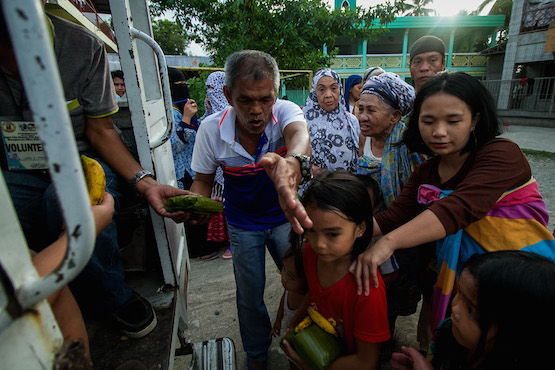Christians provide hot meals to Muslim Marawi refugees
The Catholic Church has organized a community kitchen for internally displaced people who fled the terror attack on Marawi City in Mindanao.
Jun 15, 2017

By Mark Saludes
The Catholic Church has organized a community kitchen for internally displaced people who fled the terror attack on Marawi City in Mindanao.
One aim has been to provide hot meals for Muslim refuges as they break their fast in the evening during Ramadan, the annual fasting month.
"The initiative aims to boost their morale by showing solidarity as well as the support of non-Muslim groups and individuals," said April Thessa Diaz.
Diaz, program coordinator of the Rural Missionaries of the Philippines, said the meals shared in the community kitchen "are the products of synchronized efforts by Christians who helped raise funds for the food."
On June 9, the first day of the program, Christian volunteers and religious missionaries joined Muslim evacuees in their Iftar (breaking of the fast).
The community kitchen allows Muslim refugees to cook their food and observe Ramadan despite being torn from their community.
"We provide them a decent kitchen and food to cook, and let them practice their traditions to ensure cultural and religious integrity," said Diaz.
"In a way, the initiative also fosters their community spirit and hopes," she said.
The program, called Kapagugopa, a Maranao term for cooperative endeavor, is a partnership between the Rural Missionaries of the Philippines, the Congregation of the Most Holy Redeemer and ecumenical disaster response group Dambana.
The community kitchen serves small Madrasas (Islamic schools) that functioned as temporary shelters for hundreds of Muslim families.
"These Madrasas are not on the government’s list as evacuation centers. Because of that, aid couldn’t reach them," said Redemptorist Brother Ciriaco Santiago.
Santiago said that they are looking to open other evacuation centers that are "least-reached by other relief initiatives."
The religious brother said, "We will provide food aid for as long as there is food to share with the refugees."
The program is also a venue for psychosocial intervention that "encourages evacuees to speak of their experiences during the crisis."
Nardy Sabino, convener of Dambana, said aside from emergency relief aid, "evacuees need to feel that they are not alone."
Most, who sought refuge in nearby Iligan city, "fear they will have nothing left to go home to" after the government launched aerial assaults in Marawi City.
"These people have nothing but their families, and few belongings. They are now struggling to survive in spite of the trauma from the armed conflict," said Sabino.
On June 13, the Department of Social Welfare and Development said that there are 65, 198 families or 316, 684 individuals who have been displaced from Marawi City and nearby towns.
In a statement, department secretary Judy Taguiwalo said that they are "fast-tracking" the distribution of about US$20 cash assistance to evacuees.
"Our goal is to distribute the assistance as soon as possible so the evacuees may start using it," said Taguiwalo.
Sabino called on Catholic and Protestant churches "to act together and demonstrate solidarity" to the people of Mindanao affected by the conflict.
"There is an urgent need to address the issue. We need to step up our interfaith and humanitarian responses to the crisis," Sabino said.--ucanews.com







Total Comments:0